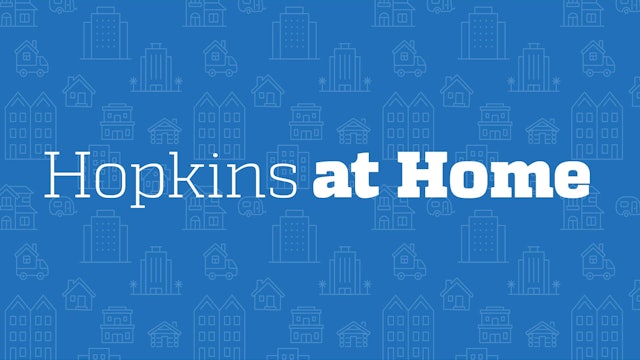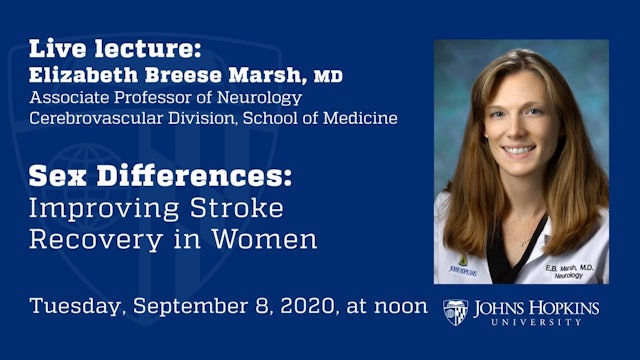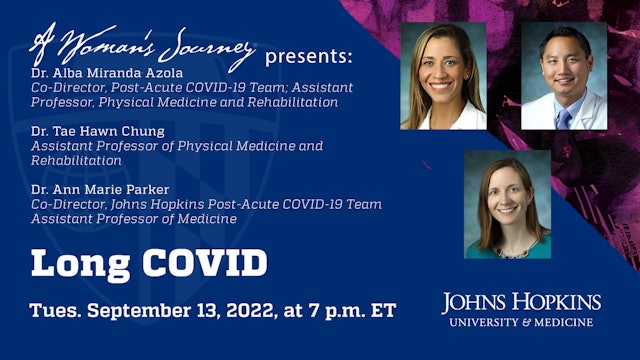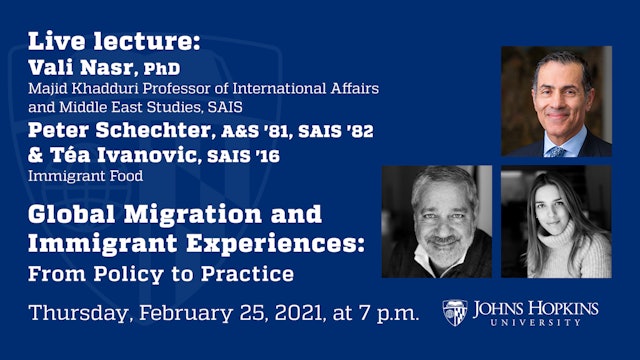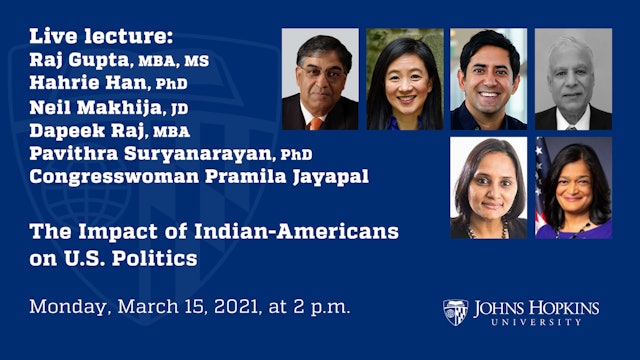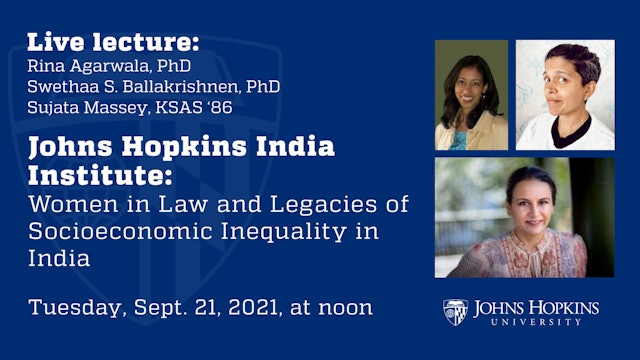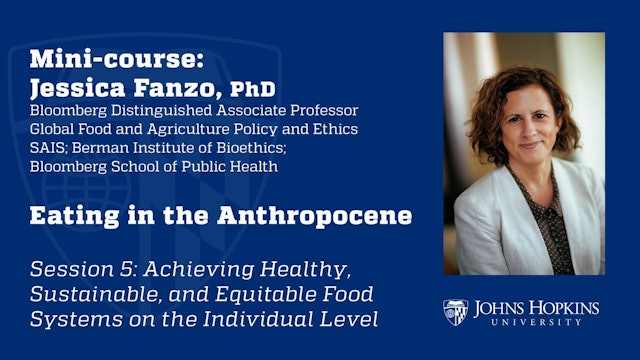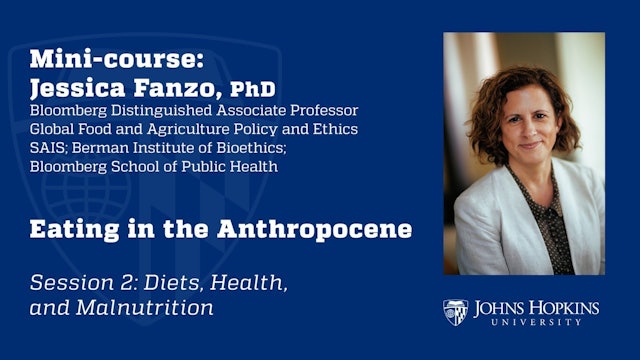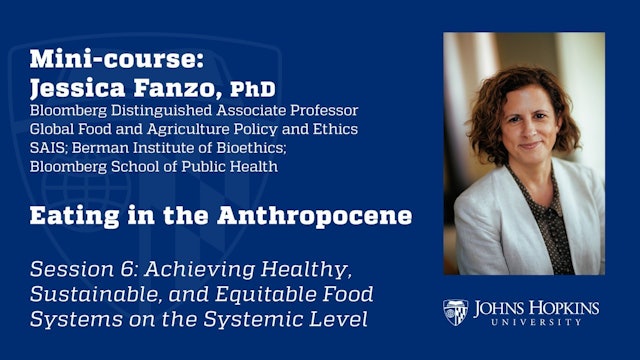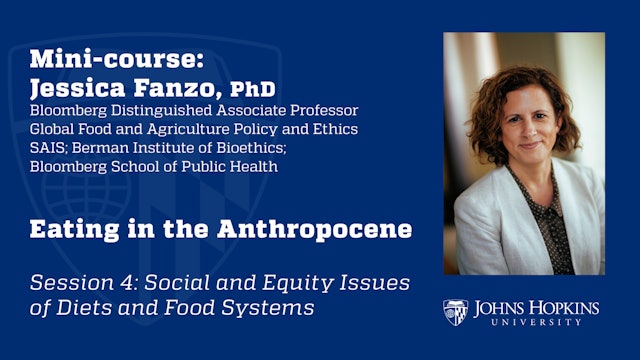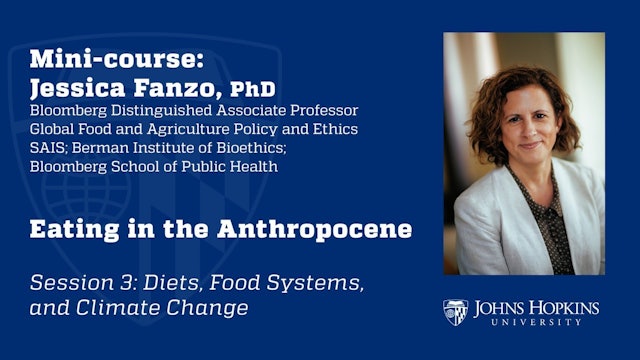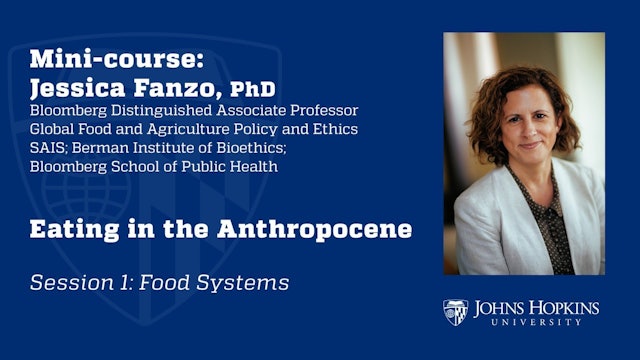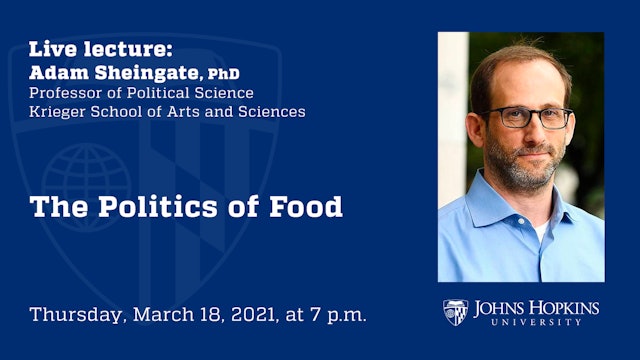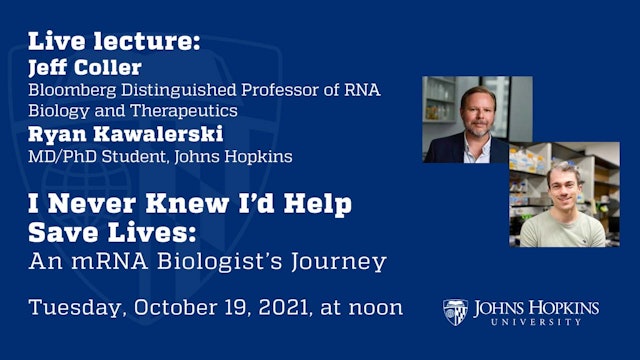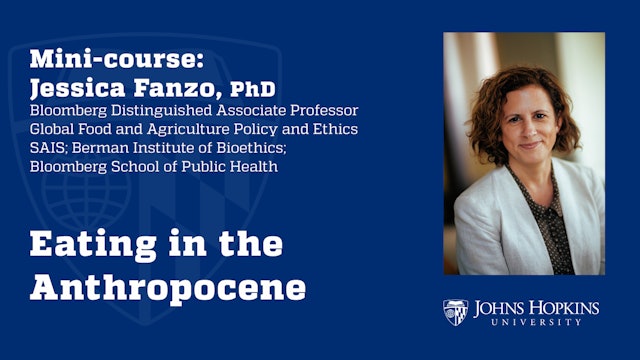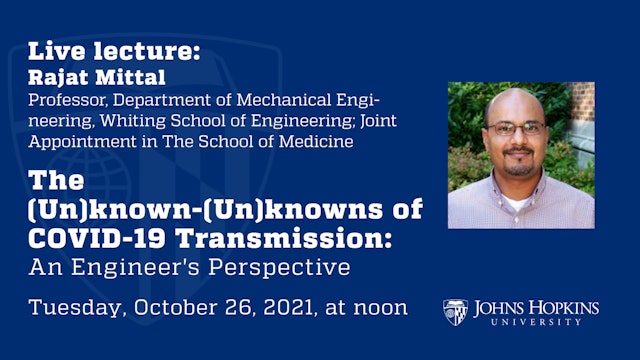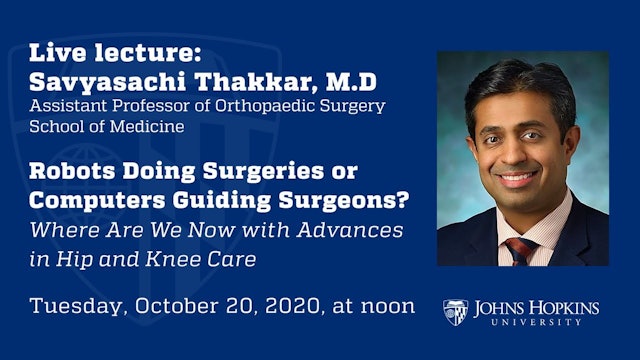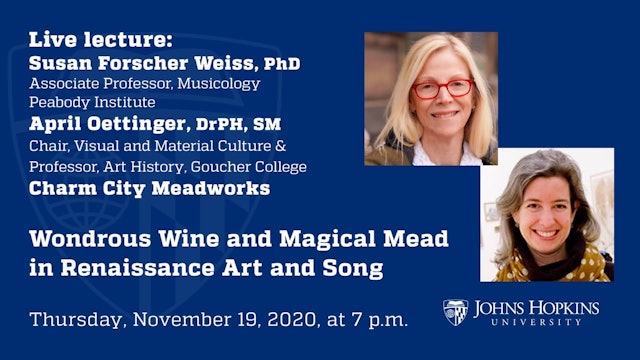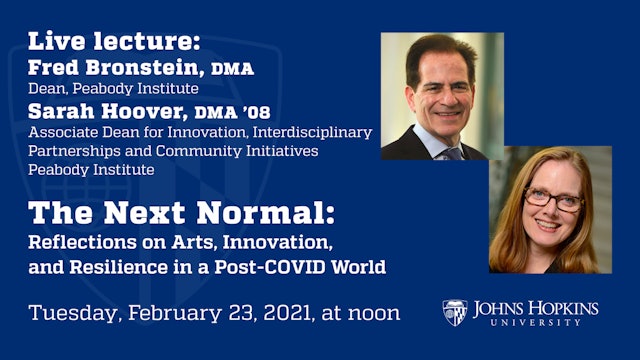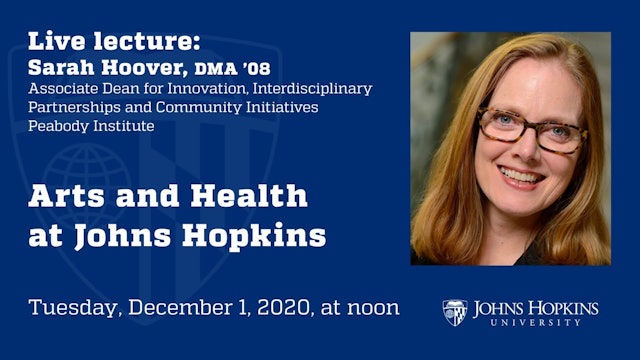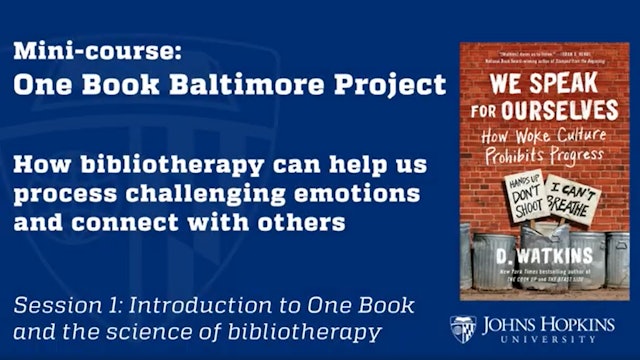Medicine & Public Health
-
A Woman's Journey: Walking on Pins and Needles
Did you know that more than 20 million people in the U.S. are estimated to have some form of peripheral neuropathy that can be caused by diabetes, chemotherapy and other health conditions, and can result in motor, sensory and autonomic nerve damage? In this month's Johns Hopkins Medicine A Woman'...
-
A Woman's Journey: Surprising Tips to Reduce Heart Disease
The American Heart Association says cardiovascular disease is the leading cause of death in the United States and the CDC reports that over 60 million women (44%) in the United States are living with some form of heart disease.2 Heart disease is the leading cause of death for women in the United ...
-
Secret (and Not So Secret) Signs of Arrhythmia
Just what causes a cardiac arrhythmia? What are the signs you are experiencing an arrhythmia? What are the different types of arrhythmias? Get the answers to these questions and more, and learn about the various approaches to monitor your heart rhythm, with Hugh Calkins, M.D., cardiologist and di...
-
Sex Differences: Improving Stroke Recovery in Women
We’ve always known that there are important differences between women and men. But this can become particularly important when thinking about health risk factors and recovery after a life altering event like a stroke. In this livestream, Associate Professor of Neurology Elizabeth Marsh, MD will d...
-
A Woman's Journey Presents: Long Covid
Johns Hopkins' Dr. Alba Miranda Azola, Dr. Tae Hawn Chung, and Dr. Ann Marie Parker discuss the newest find of the being infected with Covid-19 and what term Long Covid means and pertains to.
-
Space Surgery
Space Surgery; for this event, as well as similar events in the future, involving various topics related to human spaceflight. These events are hosted by the Commercial and Government Program Office of the Johns Hopkins University Whiting School of Engineering.
SPEAKERS; Dr. Mark Shelhamer, Dr. ...
-
Global Migration and Immigrant Experiences: From Policy to Practice
Former SAIS Dean and current Majid Khadduri Professor of International Affairs and Middle East Studies, Vali Nasr joins Immigrant Food partners and SAIS alums Peter Schechter and Téa Ivanovic in a wide-ranging conversation about the growing role of business in social justice and advocacy, the cha...
-
The Impact of Indian-Americans on U.S. Politics
Co-Hosted by the Johns Hopkins India Institute and SNF Agora Institute
Indian-Americans, though representing just over 1% of the U.S. population, play a critical and growing role in the U.S. democratic process, in the spotlight now more than ever that Kamala Harris has become the country’s first...
-
Johns Hopkins India Institute:Women in Law and Socioeconomic Inequality in India
Please join the Johns Hopkins India Institute and Hopkins at Home for a panel discussion on the role of women in the legal profession and the legacies of socioeconomic inequality in India. Drawing from both literary and social science perspectives, the panel will feature JHU alumna and award-winn...
-
Session 5: Eating in the Anthropocene: Food on an Individual Level
"You are what you eat” is a phrase familiar to many but what do you really know about food systems and diets? This course examines the complex interactions between food systems, diets, and the environment, as well as the political, social, and ethical issues to achieve both human and planetary he...
-
Session 2: Eating in the Anthropocene: Diets, Health, and Malnutrition
"You are what you eat” is a phrase familiar to many, but what do you really know about food systems and diets? This course examines the complex interactions between food systems, diets, and the environment, as well as the political, social, and ethical issues to achieve both human and planetary h...
-
Session 6: Eating in the Anthropocene: Food on a Systemic Level
"You are what you eat” is a phrase familiar to many but what do you really know about food systems and diets? This course examines the complex interactions between food systems, diets, and the environment, as well as the political, social, and ethical issues to achieve both human and planetary he...
-
Session 4: Eating in the Anthropocene: Social & Equity Issues
"You are what you eat” is a phrase familiar to many but what do you really know about food systems and diets? This course examines the complex interactions between food systems, diets, and the environment, as well as the political, social, and ethical issues to achieve both human and planetary he...
-
Session 3: Eating in the Anthropocene: Diets, Food Systems, and Climate Change
"You are what you eat” is a phrase familiar to many but what do you really know about food systems and diets? This course examines the complex interactions between food systems, diets, and the environment, as well as the political, social, and ethical issues to achieve both human and planetary he...
-
Session 1: Eating in the Anthropocene: Food Systems
"You are what you eat” is a phrase familiar to many, but what do you really know about food systems and diets? This course examines the complex interactions between food systems, diets, and the environment, as well as the political, social, and ethical issues to achieve both human and planetary h...
-
The Politics of Food
Food is central to our daily lives, yet few of us consider the political implications of what we eat. How does our personal connection to, and daily consumption of, food shape how we think about these issues? What does food and agriculture tell us about the political process and the power of spec...
-
I Never Knew I’d Help Save Lives: An mRNA Biologist’s Journey
Today, Jeff Coller, PhD, studies the building blocks of life. As a Bloomberg Distinguished Professor of RNA Biology and Therapeutics and a Scientific Co-Founder at Tevard Biosciences, his work focuses on messenger RNA, a molecule that transmits information from DNA to other parts of the cell. Wit...
-
Eating in the Anthropocene
6 items
“You are what you eat” is a phrase familiar to many but what do you really know about food systems and diets? This course examines the complex interactions between food systems, diets, and the environment, and the political, social, and ethical issues to achieve both human and planetary health. W...
-
The (Un)known-(Un)knowns of COVID-19 Transmission - An Engineer's Perspective
COVID-19 spread across the world with a speed and intensity that laid bare the limits of our understanding of the transmission pathways of such respiratory diseases. After much confusion and misinformation, there emerged a consensus that airborne transmission from very small respiratory droplets ...
-
Robots Doing Surgeries or Computers Guiding Surgeons Advances
There are several advances in the non-operative and operative care of patients with hip and knee problems. Technical and technological innovations have provided a cutting-edge to patients and providers alike. Savyasachi “Savya” Thakkar, M.D., Assistant Professor of Orthopaedic Surgery, leads a di...
-
Wondrous Wine and Magical Mead in Renaissance Art and Song
In vino veritas! As the ancient Roman encyclopedist Pliny the Elder (1st c., c.e.) famously put it, the fermented grape possesses the power to elucidate truth and to foment joy and laughter. Join Dr. Susan Weiss (Associate Professor of Musicology, JHU) and Dr. April Oettinger (Professor of Art Hi...
-
The Next Normal: Reflections on Arts Innovation and Resilience Post-COVID
The performing arts industry has been thoroughly upended by the COVID-19 pandemic, with venues shut down, performances canceled, and artists out of work. A Brookings Institution report issued last summer estimated the damage in the fine and performing arts at almost 1.4 million jobs and $42.5 bil...
-
Arts and Health at Johns Hopkins
What might healing look like if the arts were thoroughly integrated into the healthcare environment? What would Johns Hopkins University and Health Systems look like if precision medicine and state-of-the-art care included (1) the arts in training, professional development, and support for the we...
-
How Bibliotherapy Can Help Us Process Challenging Emotions and Connect
3 items
Baltimore City’s residents have long struggled with issues of inequity, poverty, and violence. In 2020, on top of a crippling pandemic, Baltimore saw 335 individuals die by homicide. In the face of a virtual school year necessitated by quarantine, opportunities for young people to connect with ea...



